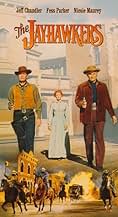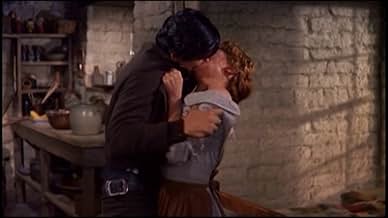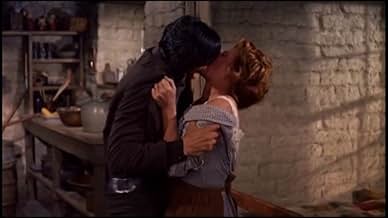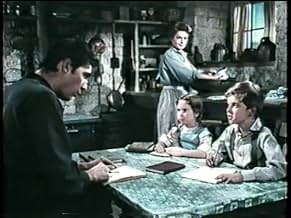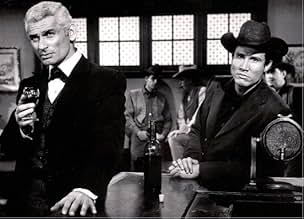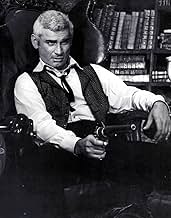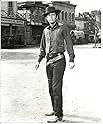Before the U.S. Civil War rebel leader Luke Darcy sees himself as leader of a new independent Republic of Kansas but the military governor sends an ex-raider to capture Darcy.Before the U.S. Civil War rebel leader Luke Darcy sees himself as leader of a new independent Republic of Kansas but the military governor sends an ex-raider to capture Darcy.Before the U.S. Civil War rebel leader Luke Darcy sees himself as leader of a new independent Republic of Kansas but the military governor sends an ex-raider to capture Darcy.
Al Wyatt Sr.
- Jayhawker
- (as Allan Wyatt)
Featured reviews
A fun to watch western containing Fess Parker's best performance, the show is stolen by Jeff Chandler's performance as the baddie you hate to see taken down. However, as outstanding as Chandler is, the real star of the film is Jerome Moross' pulse-pounding score, which predates his legendary music for THE BIG COUNTRY. It's every bit as good, if not better. Henry Silva is (of course) scuzzy as a hired gun.
Catch it. Any western fan won't regret it.
Catch it. Any western fan won't regret it.
There is a French touch in this western which is closer to a political fable than to the usual stuff.Besides,the family Parker meets is French ,which is very rare in the genre.
Jeanne Dubois tells him so :"we came in America ,because we were in search of liberty";if the movie takes place at the end of the Civil War,then it was still )Napoleon (the Third , the nephew of Bonaparte)who was ruling the country (1848-1870);it was a dictatorship that led the country to war with Prussia / Germany (with disastrous consequences later in the twentieth century).Hence Jeanne's remark ,even though she does not hint at both emperors at all.
On the other hand ,Luke Darcy admires Napoleon (the First),with his inflated ego;it's not a cardboard character though ;he is a true demagogue,like far-right wing leaders ,he promises lots of things (schools ,hospitals),he's perhaps convinced he works for the greater good of his future subjects ,for he has an empire in mind ;and yet he remains deaf to the father's plea .As for Parker's wife ,her fate remains ambiguous ;as is his relationship with his enemy who reminds him of his own brother.
In spite of some implausibilities (the little girl survives the stampede),the story is not that simple .
A note about Nicole Maurey ,who recently passed away:she began her career with a masterpiece ("Journal D'Un Curé De Campagne " aka "diary of a country priest" by Robert Bresson) ,then continued to work in her native country ("Action Immédiate" )and in the US ('secret of the incas" opposite Charlton Heston.);but trying to do too many things at once ,she never became a true star in both countries.
Henry Silva ,who plays a supporting part in "the jayhawkers" ,enjoyed a career in Europa (mainly in Italy) in the seventies .
Jeanne Dubois tells him so :"we came in America ,because we were in search of liberty";if the movie takes place at the end of the Civil War,then it was still )Napoleon (the Third , the nephew of Bonaparte)who was ruling the country (1848-1870);it was a dictatorship that led the country to war with Prussia / Germany (with disastrous consequences later in the twentieth century).Hence Jeanne's remark ,even though she does not hint at both emperors at all.
On the other hand ,Luke Darcy admires Napoleon (the First),with his inflated ego;it's not a cardboard character though ;he is a true demagogue,like far-right wing leaders ,he promises lots of things (schools ,hospitals),he's perhaps convinced he works for the greater good of his future subjects ,for he has an empire in mind ;and yet he remains deaf to the father's plea .As for Parker's wife ,her fate remains ambiguous ;as is his relationship with his enemy who reminds him of his own brother.
In spite of some implausibilities (the little girl survives the stampede),the story is not that simple .
A note about Nicole Maurey ,who recently passed away:she began her career with a masterpiece ("Journal D'Un Curé De Campagne " aka "diary of a country priest" by Robert Bresson) ,then continued to work in her native country ("Action Immédiate" )and in the US ('secret of the incas" opposite Charlton Heston.);but trying to do too many things at once ,she never became a true star in both countries.
Henry Silva ,who plays a supporting part in "the jayhawkers" ,enjoyed a career in Europa (mainly in Italy) in the seventies .
Shortly before the start of the American Civil War rebel Kansas leader Luke Darcy (Jeff Chandler) plans a new independent Republic of Kansas and craving for loot . His vigilante group is called The Jayhawkers and their depredations contributed to the descent of the Missouri-Kansas border region into some of the most vicious guerrilla fighting of the Civil War. Their mission is to end slavery by force but degenerating so completely into a squalid, murderous, slugging match . However, rebel leader Darcy uses The Jayhawkers for his own bid for absolute control of Kansas. Darcy's actions do not sit well with the military governor of Kansas, William Clayton (Herbert Rudley) , as the government command instituted martial law due to "the crime of armed depredations or jay-hawking having reached a height dangerous to the peace and posterity to the whole State (Kansas) and seriously compromising the Union cause in the border counties of Missouri. As William Clayton supposedly wants Darcy captured and brought to justice. For this aim the governor hires an ex-renegade rebel , Cam Bleeker (Fess Parker) , to join Darcy's group and capture their leader . Bleeker has a personal reason for wanting to see Darcy hanged and he's craving for revenge . Darcy was responsible for Bleeker wife's death while Bleeker was in prison .
Exciting film inspired by historical facts set during pre-American Civil War (1861-1865) in which the Jayhackers use guerrilla warfare to destroy targets and led by men set on revenge, invading peaceful towns , making violent raids in Kansas territory . The picture efficiently describes the atmosphere of violence and confrontation among bands and bloody assaults . Stars the known hero Fess Parker-pre Daniel Boone- as the ex-con and an ex-raider whom the military governor sends to capture Darcy well played by Jeff Chandler . Along with this excellent duo there are various notorious actors and familiar faces accompanying them such as : Nicole Maurey , Henry Silva , Herbert Rudley , Frank DeKova , Don Megowan , Leo Gordon , Jack Kruschen , Glen Stange , and Harry Dean Stanton. The motion picture was well directed by Melvin Frank.
The picture was based on historical events , these were the following ones : Jayhawkers and red legs are terms that came to prominence in Kansas Territory, during the Bleeding Kansas period of the 1850s ; they were adopted by militant bands affiliated with the free-state cause during the American Civil War . These gangs were guerrillas who often clashed with pro-slavery groups from Missouri, known at the time in Kansas Territory as "Border Ruffians" or "Bushwhackers." After the Civil War, the word "Jayhawker" became synonymous with the people of Kansas, or anybody born in Kansas. Today a modified version of the term, Jayhawk, is used as a nickname for a native-born Kansan. The meaning of the jayhawker term evolved in the opening year of the American Civil War. When Charles Jennison, one of the territorial-era jayhawkers, was authorized to raise a regiment of cavalry to serve in the Union army, he characterized the unit as the "Independent Kansas Jay-Hawkers" on a recruiting poster. The regiment was officially termed the 7th Regiment Kansas Volunteer Cavalry, but was popularly known as Jennison's Jayhawkers. Thus, the term became associated with Union troops from Kansas. After the regiment was banished from the Missouri-Kansas border in the spring of 1862, it went on to participate in several battles including Union victories of the Battle of Iuka and the Second Battle of Corinth. Late in the war, the regiment returned to Kansas and contributed to Union victory in one of the last major battles in the Missouri-Kansas theater, the Battle of Mine Creek. The Jayhawker term was applied not only to Jennison and his command, but to any Kansas troops engaged in punitive operations against the civilian population of western Missouri, in which the plundering and arson that characterized the territorial struggles were repeated, but on a much larger scale. For example, the term "Jayhawkers" also encompassed Senator Jim Lane and his Kansas Brigade, which sacked and burned Osceola, Missouri. In the first year of the war, much of the movable wealth in western Missouri had been transferred to Kansas, and large swaths of western Missouri had been laid waste, by an assortment of Kansas Jayhawkers ranging from outlaws and independent military bands to rogue federal troops such as Lane's Brigade and Jennison's Jayhawkers. In February 1862, the Union command instituted martial law due to "the crime of armed depredations or jay-hawking having reached a height dangerous to the peace and posterity to the whole State (Kansas) and seriously compromising the Union cause in the border counties of Missouri.
Exciting film inspired by historical facts set during pre-American Civil War (1861-1865) in which the Jayhackers use guerrilla warfare to destroy targets and led by men set on revenge, invading peaceful towns , making violent raids in Kansas territory . The picture efficiently describes the atmosphere of violence and confrontation among bands and bloody assaults . Stars the known hero Fess Parker-pre Daniel Boone- as the ex-con and an ex-raider whom the military governor sends to capture Darcy well played by Jeff Chandler . Along with this excellent duo there are various notorious actors and familiar faces accompanying them such as : Nicole Maurey , Henry Silva , Herbert Rudley , Frank DeKova , Don Megowan , Leo Gordon , Jack Kruschen , Glen Stange , and Harry Dean Stanton. The motion picture was well directed by Melvin Frank.
The picture was based on historical events , these were the following ones : Jayhawkers and red legs are terms that came to prominence in Kansas Territory, during the Bleeding Kansas period of the 1850s ; they were adopted by militant bands affiliated with the free-state cause during the American Civil War . These gangs were guerrillas who often clashed with pro-slavery groups from Missouri, known at the time in Kansas Territory as "Border Ruffians" or "Bushwhackers." After the Civil War, the word "Jayhawker" became synonymous with the people of Kansas, or anybody born in Kansas. Today a modified version of the term, Jayhawk, is used as a nickname for a native-born Kansan. The meaning of the jayhawker term evolved in the opening year of the American Civil War. When Charles Jennison, one of the territorial-era jayhawkers, was authorized to raise a regiment of cavalry to serve in the Union army, he characterized the unit as the "Independent Kansas Jay-Hawkers" on a recruiting poster. The regiment was officially termed the 7th Regiment Kansas Volunteer Cavalry, but was popularly known as Jennison's Jayhawkers. Thus, the term became associated with Union troops from Kansas. After the regiment was banished from the Missouri-Kansas border in the spring of 1862, it went on to participate in several battles including Union victories of the Battle of Iuka and the Second Battle of Corinth. Late in the war, the regiment returned to Kansas and contributed to Union victory in one of the last major battles in the Missouri-Kansas theater, the Battle of Mine Creek. The Jayhawker term was applied not only to Jennison and his command, but to any Kansas troops engaged in punitive operations against the civilian population of western Missouri, in which the plundering and arson that characterized the territorial struggles were repeated, but on a much larger scale. For example, the term "Jayhawkers" also encompassed Senator Jim Lane and his Kansas Brigade, which sacked and burned Osceola, Missouri. In the first year of the war, much of the movable wealth in western Missouri had been transferred to Kansas, and large swaths of western Missouri had been laid waste, by an assortment of Kansas Jayhawkers ranging from outlaws and independent military bands to rogue federal troops such as Lane's Brigade and Jennison's Jayhawkers. In February 1862, the Union command instituted martial law due to "the crime of armed depredations or jay-hawking having reached a height dangerous to the peace and posterity to the whole State (Kansas) and seriously compromising the Union cause in the border counties of Missouri.
If you're going to watch a Jeff Chandler western, this is the one to see. I'd hestitate to call it a masterpiece, but it's a damn good try. Produced and directed by the team of Norman Panama and Melvin Frank, it is a tale of conflicting loyalties, megalomania, love, hate and a number of other issues I can't remember, in pre-Civil War Kansas on the eve of the Civil War. Star Jeff Chandler, who portrays the megalomaniacal but withal personally decent and charismatic bad guy, is quite good here. He had spent a decade in action pictures and romances, with an occasional comedy thrown in for good measure, and yet had not achieved major stardom. A mid-level star of the kind of medium grade movie that was going out of fashion, he was on the verge of becoming an anachronism; and had he not died a couple of years after this film one wonders what would have happened to him and his career. In The Jayhawkers he shows what he might have become: a fine, commanding, aristocratic character actor.
As the second-billed good guy, Fess Parker, fresh from his triumph as Davy Crockett a few years earlier, was attempting a mainstream, post-Disney career. Low-key and phlegmatic, and not without appeal, he lacks the edge of a Mitchum that might have propelled him into the big leagues, and is for the most part an uninteresting hero. Nicole Maurey is the incongruously Gallic love interest, and one can't help be curious as to why she was cast in this film. She was a lovely young woman, but way out of place here.
Loyal Griggs color photography is as good as his work in Shane, and far less mannered. The music of Jerome Moross is stirring and in its way as good as anything Dimitri Tiomkin ever did. With its larger than life good-bad guy, and reasonable (for a movie) historical accuracy, this could have been a major film. The problem with it is that though Panama and Frank were quite good at light comedy, they were inexperienced in the western genre. Frank does a good, derivative job of drawing from Ford and Hawkes; and there are some breathtaking vistas. There is even a touch of Nicholas Ray in his creative and interesting use of interiors, especially the main hideout. And Chandler gives an at times daring performance, with occasional lapses into mild effeminacy in his vocalizing and posture, his work is well-rounded and sophisticated, suggesting that his character's feeling for Parker is more than just friendship. Alas, this daring aspect of the story is never gone into with any depth or insight, and the result the movie is a near-miss, but a fascinating one.
As the second-billed good guy, Fess Parker, fresh from his triumph as Davy Crockett a few years earlier, was attempting a mainstream, post-Disney career. Low-key and phlegmatic, and not without appeal, he lacks the edge of a Mitchum that might have propelled him into the big leagues, and is for the most part an uninteresting hero. Nicole Maurey is the incongruously Gallic love interest, and one can't help be curious as to why she was cast in this film. She was a lovely young woman, but way out of place here.
Loyal Griggs color photography is as good as his work in Shane, and far less mannered. The music of Jerome Moross is stirring and in its way as good as anything Dimitri Tiomkin ever did. With its larger than life good-bad guy, and reasonable (for a movie) historical accuracy, this could have been a major film. The problem with it is that though Panama and Frank were quite good at light comedy, they were inexperienced in the western genre. Frank does a good, derivative job of drawing from Ford and Hawkes; and there are some breathtaking vistas. There is even a touch of Nicholas Ray in his creative and interesting use of interiors, especially the main hideout. And Chandler gives an at times daring performance, with occasional lapses into mild effeminacy in his vocalizing and posture, his work is well-rounded and sophisticated, suggesting that his character's feeling for Parker is more than just friendship. Alas, this daring aspect of the story is never gone into with any depth or insight, and the result the movie is a near-miss, but a fascinating one.
"The Jayhawkers" was released in 1959 and starred Jeff Chandler as an ambitious person eager to control pre-War Kansas, and Fess Parker has to try and stop him in his scheme. Reason: Parker, as Cam Beeker, had broken out of a federal prison to try and come back to his wife, and his ranch in Kansas. He finds that his wife has died, and the ranch has been sold to a family, headed by French actress Nicole Maurey. He also learns that Luke Darcy, played by Chandler, was the reason behind his wife's death and the ranch being lost. Beeker becomes a member of the gang in order to win his pardon from the territorial governor of Kansas. Upon joining the gang of raiders calling themselves the Jayhawkers, he starts to accept the ambition of Darcy, because the man seems intent on bringing peace to the territory, but under his rule. The viewer of this watchable western will be asking which way Parker's character will finally go; either turn Darcy over to the governor, or become part of the plan to control the territory. A good 7/10
Did you know
- TriviaThe theme for TV's Wagon Train (1957) was taken directly from the Jerome Moross score of this film when Moross worked on the western series.
- GoofsTopeka is referred to as the Capitol of Kansas, during the time period depicted in the film, prior to the Civil War, the capitol of the Kansas Territory was actually Lecompton.
- Quotes
Luke Darcy: I've got what I want. I've got Kansas.
- ConnectionsReferenced in Mission: Impossible: The Mind of Stefan Miklos (1969)
- How long is The Jayhawkers!?Powered by Alexa
Details
- Release date
- Country of origin
- Language
- Also known as
- Cuando mueren los malvados
- Filming locations
- Production company
- See more company credits at IMDbPro
- Runtime
- 1h 40m(100 min)
- Aspect ratio
- 1.85 : 1
Contribute to this page
Suggest an edit or add missing content

